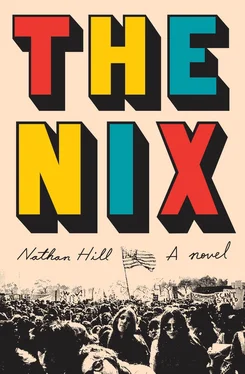The memory felt so specific because so little had changed. As Samuel took the drive again, to interview the grandfather he’d not seen in decades, he saw how everything was more or less the same. The Mississippi River valley still looked green and lush, despite being one of the most heavily chemicalized places in the country. The towns along the river still flew flags from almost every house. Ritualistic patriotism had not been dampened by two cruel decades of labor outsourcing and manufacturing shrink. Yes, the gravitational center of town had crept away from the quaint old downtown toward the big new Walmart, but nobody seemed to mind. The Walmart parking lot was bustling and full.
He saw all this as he drove around. He was, as Pwnage suggested, doing research. He was trying to breathe in the town, trying to feel what it would have been like to grow up here. His mother never spoke of it, and they rarely visited. Once every other summer, generally, when he was a kid.
But Samuel still received a trickle of information about the old hometown, and knew his grandfather was here, slowly wasting away from dementia and Parkinson’s at a nursing home called Willow Glen, where Samuel had an appointment later in the day. Until then, he planned to explore, observe, do research.
First, he found his father’s childhood home, a farm near the banks of the Mississippi. He found his mother’s too, a quaint little bungalow with a big picture window in one of the upstairs rooms. He visited her high school, which looked like any generic high school anywhere. He took a few photographs. He visited the playground near his mother’s house — the standard swing set, slide, monkey bars. He took a few photographs. He even visited the ChemStar facility where his grandfather had worked for many years, a factory so large it was impossible to take in all at once. Built along the river, surrounded by train tracks and power lines, it looked like an aircraft carrier had tumbled sideways out of the water. A mess of metal and tubing that kept going for miles, furnaces and chimneys, concrete bunker-looking buildings, steel holding tanks, round vats, smokestacks, pipes that all seemed to lead to a massive copper dome on the far north end of the factory, where if the light was shining properly it looked like a second, smaller sun rising from the ground. The atmosphere around the factory was sulfurous and overheated, a smell of exhaust, burned carbon, thin and difficult to breathe, like there wasn’t quite enough air in the air. Samuel photographed all of it. The holding tanks and twisted pipes, the brick smokestacks breathing a white cumulus vapor that disintegrated into the sky. He could not fit the factory’s whole apparatus into one frame, and so he walked down its length photographing panoramically. He hoped the photographs would shake loose something important, hoped that he could see some connection between the brutality of the ChemStar facility and his mother’s family, who for so long were tied umbilically to it. He took dozens of pictures, then left for his appointment.
He was driving to the nursing home when Periwinkle called.
“Hey, buddy,” said his publisher, his voice all echoey. “Just checking in.”
“You sound far away. Where are you?”
“In New York, in my office. I have you on speakerphone. There are protestors outside my building right now. They’re yelling and screaming. Can you hear them?”
“I can’t,” Samuel said.
“I can,” Periwinkle said. “They’re twenty stories down, but I can hear them.”
“What are they yelling?”
“I cannot actually hear them, I should say. Their speeches or whatever? Mostly I hear the drumming. Whole rock operas of it. They are drumming in a circle. Loudly and daily. Reasons unclear.”
“This must feel strange to you, being protested against.”
“They’re not protesting me, per se. Nor my company, specifically. More like the world that brought my company into being. Multinational. Globalization. Capitalism. The ninety-nine percent is, I believe, their catchphrase.”
“Occupy Wall Street.”
“That’s the one. Pretty grandiose name, if you ask me. They are not occupying Wall Street so much as a small rectangle of concrete about a thousand feet away from it.”
“I think the name is symbolic.”
“It’s a revolt against things they don’t understand. Imagine our hominid ancestors protesting a drought? This is like that.”
“A rain dance, you’re saying, this protest.”
“It’s a primitive tribal response to godlike power, yes.”
“How many people?”
“More every day. It started with a dozen. Now several dozen. They try to engage us in conversation as we go to work.”
“You should try talking to them.”
“I did once. This kid, maybe twenty-five years old. He was down by the drum circle, juggling. His hair was in white-boy dreads. He began every sentence with the word ‘Well.’ It was a tic he had. But he pronounced it like wool. I literally could not hear anything else he said.”
“So not a true dialogue, then.”
“Have you ever protested anything?”
“Once.”
“How was it?”
“Unsuccessful.”
“A drum circle. Jugglers. They’re a living, breathing non sequitur in the middle of the financial district. But what they don’t understand is that there is nothing capitalism loves so much as a non sequitur. This is what they need to learn. Capitalism gobbles up non sequiturs happily.”
“By non sequitur you mean…”
“You know, the fashionable. The trendy. Every trend begins its life as a fallacy.”
“That maybe explains Molly Miller’s new video.”
“You’ve seen it?”
“Real catchy,” Samuel said. “ ‘You have got to represent.’ What does that even mean?”
“You know, there used to be a difference between authentic music and sellout music. I’m talking about when I was young, in the sixties? Back then we knew there was a soullessness to the sellouts, and we wanted to be on the side of the artists. But now? Being a sellout is the authentic thing. When Molly Miller says ‘I’m just being real,’ what she means is that everyone wants money and fame and any artist who claims otherwise is lying. The only fundamental truth is greed, and the only question is who is up front about this. That’s the new authenticity. Molly Miller can never be accused of selling out because selling out was her goal all along.”
“The point of her song seems to be, like, be rich, have fun. ”
“She’s appealing to her audience’s latent greed and telling them it’s okay. Janis Joplin tried to inspire you to be a better person. Molly Miller tells you it’s okay to be the horrible person you already are. I’m not making a judgment about this. It’s just my job to know it.”
“But what about the juggler?” Samuel said. “The guy down at the drum circle? He doesn’t want to sell out.”
“He’s doing an impression of a protest he saw on TV once, many years ago. He has sold out, just to a different set of symbols.”
“But not to greed, is what I’m saying.”
“Are you old enough to remember Stormin’ Norman Schwarzkopf? And Scud missiles? Yellow ribbons and the line in the sand and Arsenio Hall going woof-woof-woof for the troops?”
“Yes.”
“There is nothing capitalism cannot gobble up. Non sequitur is its native language. Did you call me or did I call you?”
“You called.”
“Right. Now I remember. I heard you met with your mother.”
“I saw her, yes. I went to her apartment.”
“You were in the same room with her. What did she say?”
“Not much.”
“You were in the same room and you heroically overcame years of resentment and she opened up to you in a way she’s never opened up to anyone before, spilling out a dramatic life story that ideally concludes after two hundred and fifty pages of easy reading, give or take.”
Читать дальше












